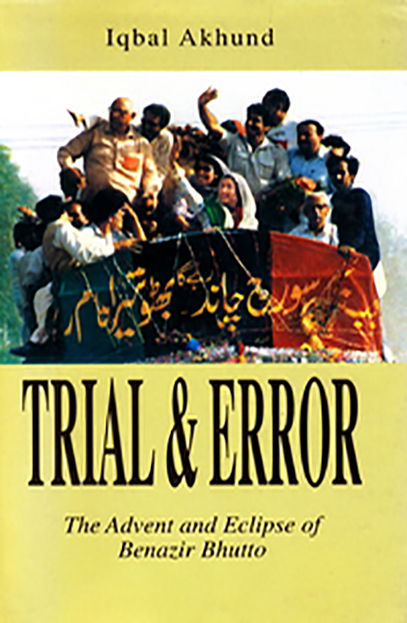Trial and Error: The Advent and Eclipse of Benazir Bhutto
https://uplbooks.com/shop/9789840515448-trial-and-error-the-advent-and-eclipse-of-benazir-bhutto-6529 https://uplbooks.com/web/image/product.template/6529/image_1920?unique=90f5a49
| Language: English |
Tags :
Book Info
Benazir Bhutto, twice Prime Minister of Pakistan, daughter of a prime minister, a daughter of the east, is a charismatic figure in Pakistan’s politics and on the world stage. She has been the main protagonist on Pakistan’s political stage ever since the execution of her father, Zulfikar Ali Bhutto. Her advent marked the transition to democracy but her performance has been controversial. Her capacity to inspire admiration and devotion and in almost equal degree, to arouse animosity and controversy, remains, unaffected by the vicissitudes of her political career arid personal life. A woman twice elected to head the government in a country with a tradition of male dominance, she continues to be a major factor in the country’s politics. This book tries to strike a balance between the unrelenting criticism of her political adversaries, the adulation of her followers, and the disappointed hopes of her well-wishers. Iqbal Akhund, who was Adviser on National Security and Foreign Affairs in Benazir Bhutto’s first cabinet (November 1988—August 1990), describes the challenges and opportunities that faced the Benazir government during the twenty-month transition from a waning dictatorship to an incipient democracy and examines with objectivity and inside knowledge, its success and failures. When Benazir Bhutto rose to the exalted position of prime minister of Pakistan in 1988, she did so defying all accepted norms. Akhund’s Trial and Error brings into sharp relief the strengths and fatal foibles of Benazir’s first term in office as Pakistan’s prime minister — which, unbelievably, lasted a bare 20 months but continues to be something of a milestone in Pakistan’s 50 years as an independent country. —M.H. Askari columnist, Dawn

Iqbal Akhund
Iqbal Akhund is a pioneer diplomat of Pakistan whose career has spanned four decades. He made his mark at the UN where he served as Pakistan’s Permanent Representative and later as Assistant Secretary-General. In 1976, when he was simultaneously President of the Security Council, Chairman of the Economic and Social Council, and of the developing countries’ grouping, the Group of 77, he was voted among the twelve top international diplomats of the year. In 1979, as Assistant Secretary-General he served as the Secretary-General’s Special Representative in Lebanon till 1984, and then at the UN headquarters in New York as Head of the Centre Against Apartheid till 1987. On the return of democracy in Pakistan in 1988, Iqbal Akhund returned to

ইকবাল আকুন্দ
Iqbal Akhund is a pioneer diplomat of Pakistan whose career has spanned four decades. He made his mark at the UN where he served as Pakistan’s Permanent Representative and later as Assistant Secretary-General. In 1976, when he was simultaneously President of the Security Council, Chairman of the Economic and Social Council, and of the developing countries’ grouping, the Group of 77, he was voted among the twelve top international diplomats of the year. In 1979, as Assistant Secretary-General he served as the Secretary-General’s Special Representative in Lebanon till 1984, and then at the UN headquarters in New York as Head of the Centre Against Apartheid till 1987. On the return of democracy in Pakistan in 1988, Iqbal Akhund returned to



